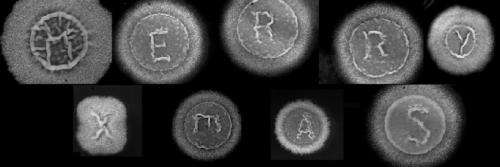Bacteria are wishing you a Merry Xmas

A bacterium has been used to wish people a Merry Xmas. Grown by Dr Munehiro Asally, an Assistant Professor at the University of Warwick, the letters used to spell MERRY XMAS are made of Bacillus subtilis, a non-pathogenic bacterium which is found in soil and also human gut.
Artificially engineered into biofilms, a structured community of microbes that can form 3D architectural patterns, the letters are 2mm wide but are made up of individual microscopic bacteria cells.
Initially left to the grow on an agar plate at 30°C for 14 hours, Dr Asally used metal stamps to encourage the biofilms to continue to growing in the shape of the letter for a further 12 hours.
Biofilms can be encouraged to grow in the shape of the letters because bacteria can naturally work together to form structures that help individual cells to survive.
Dr Asally explains:
"Whilst we may think that bacteria are solitary single cell organisms, they are in fact social and in nature almost exclusively exist in the form of structured communities.
"In forming biofilms, such as the letters, bacteria act collectively to form the structure. Physical forces are excreted by localised cell death, a process which produces the structure's shape – which then protects and supports the living cells.
Dr Asally, the leader of the Systems and Synthetic Microbiology Lab in the School of Life Sciences and Warwick Centre for Integrative Synthetic Biology (WISB), aims to investigate, amongst other matters, the physical and biological interactions behind biofilm structures.
Provided by University of Warwick

















